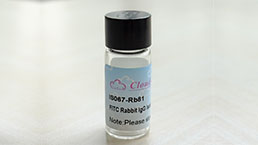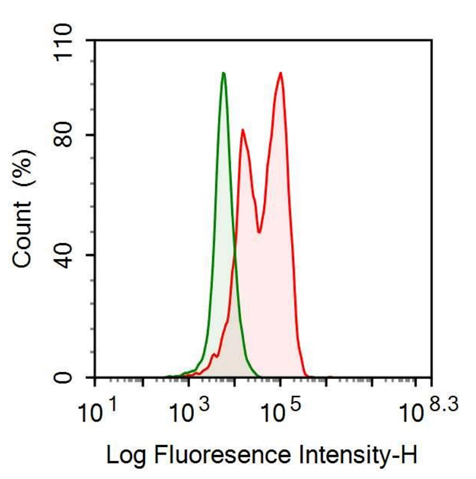Anti-Peptidyl Arginine Deiminase Type IV (PADI4) Monoclonal Antibody
PAD; PADI5; PDI4; PDI5; Peptidyl Arginine Deiminase Type V; Peptidylarginine deiminase IV
- Product No.FAF709Hu02
- Organism SpeciesHomo sapiens (Human) Same name, Different species.
- Potency (Clone Number)C12
- Ig Isotype IgG
- PurificationAntigen-specific affinity chromatography followed by Protein A affinity chromatography
- LabelNone
- Excitation Laser
- Vol. per test
- Buffer FormulationPBS, pH7.4, containing 0.02% NaN3, 50% glycerol.
- TraitsLiquid
- Organism Species Moren/a
- ApplicationsFCM
- Downloadn/a
- UOM 25test50test 100test 200test 500test
- FOB
US$ 144
US$ 240
US$ 384
US$ 480
US$ 840
For more details, please contact local distributors!
USAGE
Flow cytometry: 10µg/ml;
Optimal working dilutions must be determined by end user.
STORAGE
Store at 4°C for frequent use. Stored at -20°C in a manual defrost freezer for one year without detectable loss of activity. Avoid repeated freeze-thaw cycles.
GIVEAWAYS
INCREMENT SERVICES
-
 Protein A/G Purification Column
Protein A/G Purification Column
-
 Positive Control for Antibody
Positive Control for Antibody
-
 Tissue/Sections Customized Service
Tissue/Sections Customized Service
-
 Phosphorylated Antibody Customized Service
Phosphorylated Antibody Customized Service
-
 Flow Cytometry (FCM) Experiment Service
Flow Cytometry (FCM) Experiment Service
-
 Immunoprecipitation (IP) Experiment Service
Immunoprecipitation (IP) Experiment Service
-
 Immunofluorescence (IF) Experiment Service
Immunofluorescence (IF) Experiment Service
-
 Buffer
Buffer
-
 DAB Chromogen Kit
DAB Chromogen Kit
-
 SABC Kit
SABC Kit
-
 Isotype Control
Isotype Control
-
 Real Time PCR Experimental Service
Real Time PCR Experimental Service
| Magazine | Citations |
| Arthritis Res Ther. | Enhanced neutrophil extracellular trap generation in rheumatoid arthritis: analysis of underlying signal transduction pathways and potential diagnostic utility Pubmed:Pmc4229860 |
| Journal of Molecular Cell Biology | Peptidylarginine deiminase 4 concentration, but not polymorphisms, is associated with ICU mortality in septic shock patients Pubmed:30044533 |
| Journal of Inflammation Research | Release of active peptidylarginine deiminase into the circulation during acute inflammation induced by coronary artery bypass surgery Pubmed: 31213874 |
| Revista da Associacao Medica Brasileira | Evaluation of peptidylarginine deiminase 4 and PADI4 polymorphisms in sepsis-induced acute kidney injury |





